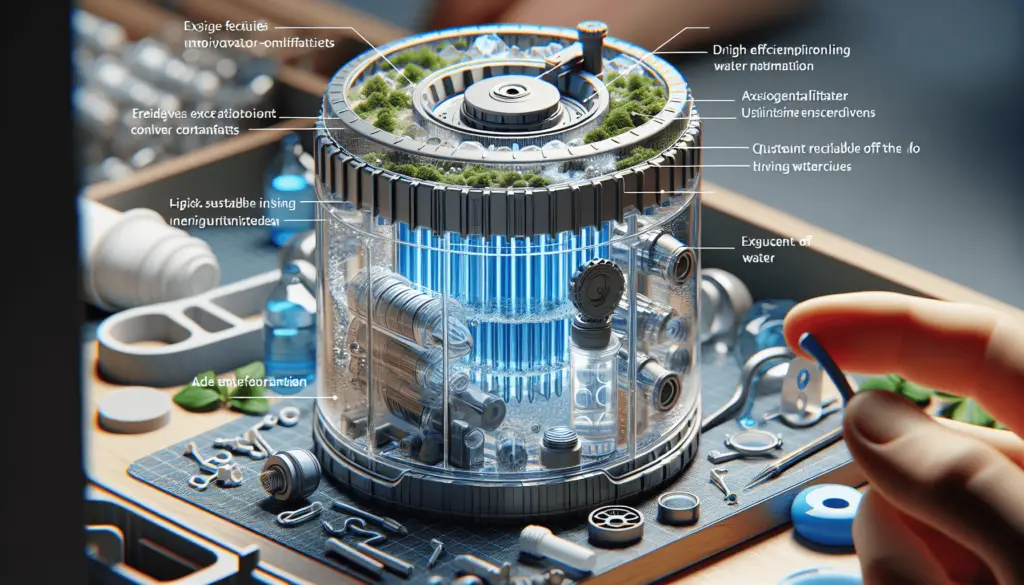Have you ever wondered how to ensure clean and safe drinking water while off-the-grid?
When you are venturing into the great outdoors or preparing for an emergency situation, having access to clean water is crucial for your health and well-being. Building a high-efficiency off-grid water filtration system can provide you with a reliable source of clean water wherever you are. In this article, we will guide you through the process of creating your own off-grid water filtration system that is efficient, cost-effective, and sustainable. Let’s get started!
Understanding the Importance of Off-Grid Water Filtration
In off-grid situations, access to clean and safe drinking water is not always guaranteed. Surface water sources such as rivers, lakes, and streams may be contaminated with harmful bacteria, parasites, chemicals, and other pollutants. Having a reliable water filtration system is essential to remove these contaminants and ensure that the water you consume is safe for drinking.
When you are off-the-grid, you may not have access to municipal water treatment facilities. This is where an off-grid water filtration system comes in handy. By building your own filtration system, you can take control of the quality of the water you drink, reducing the risk of waterborne illnesses and ensuring your overall well-being.
Choosing the Right Filtration Method
There are several filtration methods available for off-grid water systems, each with its unique features and benefits. The key is to choose a method that is suitable for the type of contaminants present in the water source you will be using.
-
Activated Carbon Filters: These filters use activated carbon to remove chemicals, odors, and impurities from water. They are effective at improving the taste and odor of water, making it more palatable to drink.
-
Reverse Osmosis Systems: Reverse osmosis systems use a membrane to filter out impurities, bacteria, and viruses from water. They are highly effective at removing a wide range of contaminants, making them ideal for off-grid applications.
-
UV Water Purifiers: UV water purifiers use ultraviolet light to kill bacteria, viruses, and other pathogens in water. They are a chemical-free way to disinfect water and are especially useful for off-grid setups where access to clean water is limited.
When selecting a filtration method for your off-grid system, consider factors such as water quality, flow rate, maintenance requirements, and cost. Choose a method that best fits your needs and the type of contaminants you are likely to encounter in your water source.
Building Your Off-Grid Water Filtration System
Now that you have chosen a filtration method, it’s time to put together your off-grid water filtration system. Here is a step-by-step guide to help you build a high-efficiency system that will provide you with clean and safe drinking water:
-
Gather Your Materials: Start by gathering all the necessary materials and tools for building your filtration system. This may include filter cartridges, pipes, fittings, a water storage container, and a water source.
-
Set Up Your Filtration System: Install the filter cartridges according to the manufacturer’s instructions, ensuring that they are securely attached and sealed. Connect the pipes and fittings to create a flow path for the water through the filters.
-
Connect the System to Your Water Source: Position your off-grid water filtration system near your water source, whether it’s a stream, lake, well, or rainwater collection system. Connect the intake pipe to the water source to start the filtration process.
-
Test the System: Turn on the water flow and allow it to pass through the filtration system. Monitor the quality of the filtered water by conducting regular tests for contaminants, pH levels, and clarity.
-
Maintain Your System: Regular maintenance is essential to keep your off-grid water filtration system running efficiently. Replace filter cartridges as needed, clean the system components, and ensure that all connections are secure.
Ensuring Water Safety and Quality
Building a high-efficiency off-grid water filtration system is just the first step. It is essential to take additional measures to ensure the safety and quality of the water you drink. Here are some tips to help you maintain clean and safe drinking water:
-
Regular Testing: Test your water regularly for contaminants, bacteria, and other pollutants. This will help you monitor the effectiveness of your filtration system and detect any issues early on.
-
Proper Storage: Store filtered water in clean containers that are free from contaminants. Ensure that the containers are tightly sealed to prevent any outside contamination.
-
Boiling Water: In situations where water quality is questionable, boiling water can help kill harmful bacteria and parasites. Boiling water for at least one minute is an effective way to make it safe for drinking.
-
UV Treatment: In addition to your filtration system, consider using a UV water purifier to further disinfect water and kill any remaining pathogens. UV treatment is a chemical-free method that can provide an extra layer of protection.
By following these tips and incorporating them into your off-grid water management plan, you can enjoy clean and safe drinking water no matter where your adventures take you.
Conclusion
Building a high-efficiency off-grid water filtration system is an essential step towards ensuring the safety and quality of the water you consume. By understanding the importance of off-grid water filtration, choosing the right filtration method, and following a step-by-step guide to building your system, you can create a reliable source of clean water wherever you are.
Remember that clean water is essential for your health and well-being, especially when you are off-the-grid and away from conventional water sources. By taking control of your water supply and investing in a high-efficiency filtration system, you can enjoy peace of mind knowing that the water you drink is safe and free from harmful contaminants.
Start building your off-grid water filtration system today and take the first step towards a healthier and more sustainable water management approach. Your body will thank you for it!

